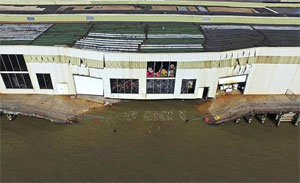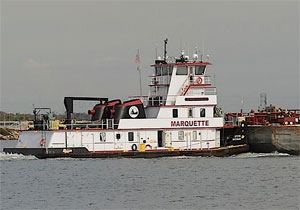The towboat Steve Richoux was downbound on the Lower Mississippi River with six barges when the pilot lost control near the Crescent City Connection bridges in New Orleans and the tow slammed into a warehouse filled with Mardi Gras costumes.
National Transportation Safety Board (NTSB) investigators traced the incident to an over-pressurized steering system on Steve Richoux that caused a loss of rudder function. The inquiry also determined an alarm that sounded just before the incident was too vague for crew to properly understand the problem.
The NTSB learned that the steering system quirks, which contributed to the steering failure, were known to some Steve Richoux crew but never reported to vessel owner Marquette Transportation. Likewise, details were not shared with the pilot and captain on the day of the accident. Both were experienced towboat operators but had little or no experience on the 1,800-hp vessel.
In conclusion, the NTSB attributed the incident “to a recurring yet unreported problem with the vessel’s steering system” that occurred when flanking rudders were placed hard to port.
“Had the captain or the pilot understood the cause of the steering failure,” the report noted, “they would only have had to move the flanking rudders off the hard-to-port position to regain steering.”
No one was injured when the two lead barges hit the Mardi Gras World warehouse at 1848 on May 7, 2018, but the incident caused more than $3 million in damage to the pier and warehouse. The two barges that struck the facility also required repairs.
Steve Richoux got underway at about 1300 on May 7 with a pilot who had never worked on the vessel. Roughly four hours later, the tow left a staging area near the Huey Long Bridge west of New Orleans with six barges loaded with cement. The tow was bound for Orange, Texas, via the Algiers Lock a few miles from Algiers Point. Progress was slow due to congestion and other issues downriver.
The pilot was at the helm as the tow approached the Crescent City Connection bridges south of the French Quarter. At the same time, the vessels lined up for a starboard-to-starboard passing arrangement with an inbound bulk carrier. The pilot placed the flanking rudders “hard to port” to keep the vessel a safe distance from the left bank.
 |
|
Photos from the NTSB report show damage to the Mardi Gras World warehouse and wharf in New Orleans. Investigators determined that the two lead barges in the vessel’s tow struck the facility due to a recurring steering problem. |
|
U.S. Coast Guard photo |
“As he did that, he began having difficulty maintaining his intended heading, so he moved the main rudders to starboard to turn the tow toward the right descending bank,” the NTSB report said. “However, with no helm control, the Steve Richoux continued to cross the river and head toward the left descending bank.”
The pilot and captain made several attempts to regain steering function, including switching from the No. 2 steering pump to the No. 1 pump. With the flanking rudders positioned hard to port and the main rudders hard to starboard, an alarm labeled only as “SHIP SERV” sounded. The captain recognized it, then silenced it.
With an impact imminent, the pilot placed the engines astern and sounded the general alarm. The lead barges struck the wharf at about 3.5 knots, collapsing numerous pilings and damaging the warehouse.
Investigators were able to replicate the steering failure after the collision. They learned that when the flanking rudders were placed hard to port, “the ram piston traveled an inch too far to the end of the ram, allowing the rudder to press up against the deck stops.”
“This happened because the piston could extend farther than the distance the rudder could turn,” the NTSB report said. “This issue would have caused the system to over-pressurize if the flanking rudders were placed hard to port, as the hydraulic pump remained on-stroke and continued to generate hydraulic pressure.”
Captains with more experience on Steve Richoux were familiar with the flaws in its steering system, but the report noted these issues were never reported to top officials with Marquette Transportation. Similarly, regular wheelhouse crew also reported the same “SHIP SERV” alarm sounding in the past.
“Neither the captain nor the pilot realized that its activation meant that the steering system was over-pressurized,” the NTSB report said. “Had the alarm been labeled as such, they would have known that the system had a problem.”
Marquette Transportation declined to comment on the NTSB findings.

